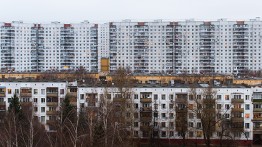Student Lecture Series | Kuba Snopek: Belyayevo Forever
Friday, February 21, 2020, 6:30 - 8:30pm

Preservation is ordinarily reserved for architecture that is unique. So how would we go about preserving buildings that are utterly generic? “Belyayevo Forever” is a provocative proposal to submit a typical Soviet housing estate to the UNESCO World Heritage list.
Kuba Snopek (b. 1985) — Urban designer, teacher and scholar of post-socialist built space, Snopek graduated from the Faculty of Architecture at Wroc.aw University of Technology and from the Rem Koolhaas-led ‘Preservation’ studio at the Moscow Strelka Institute. Between 2011 and 2015 he was a faculty member at the Strelka Institute and now works as BA Program curator at the Kharkiv School of Architecture. Snopek’s book Belyayevo Forever, about the preservation of intangible heritage, has been published in English, Polish and Russian. He initiated and co-designed Stage, a prototypical crowdsourced public space in Dnipro, Ukraine, which was awarded a Special Mention in the 2018 edition of The European Prize for Urban Public Space and nominated for the 2019 Mies van der Rohe Award.
This event is open to current Cooper Union students, faculty, and staff. Room 315F.
View the full Spring 2020 Lectures and Events List.
Located at 7 East 7th Street, between Third and Fourth Avenues




